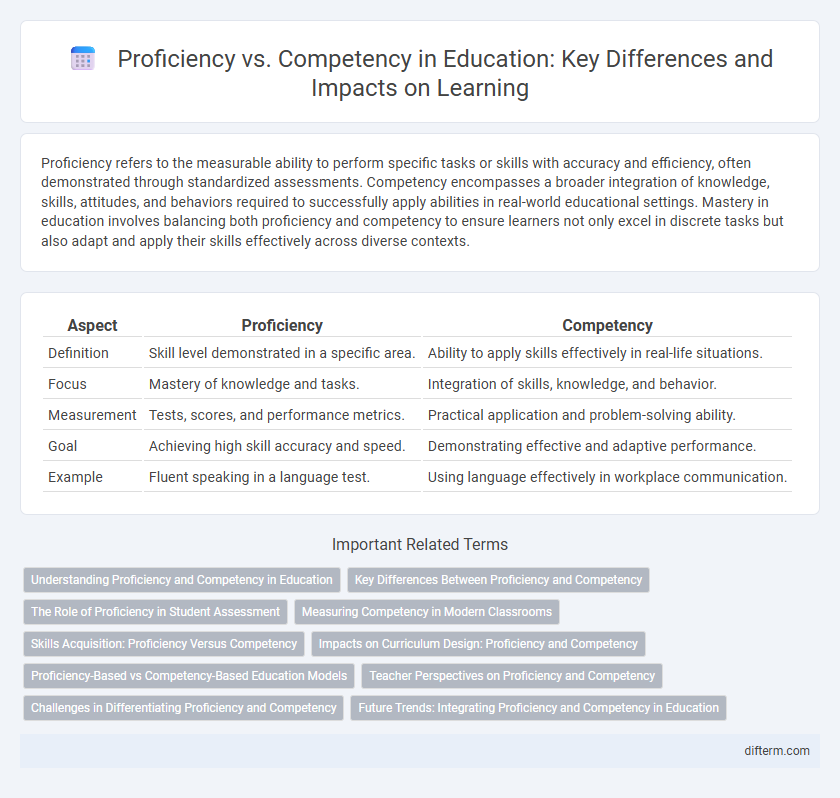Proficiency refers to the measurable ability to perform specific tasks or skills with accuracy and efficiency, often demonstrated through standardized assessments. Competency encompasses a broader integration of knowledge, skills, attitudes, and behaviors required to successfully apply abilities in real-world educational settings. Mastery in education involves balancing both proficiency and competency to ensure learners not only excel in discrete tasks but also adapt and apply their skills effectively across diverse contexts.
Table of Comparison
| Aspect | Proficiency | Competency |
|---|---|---|
| Definition | Skill level demonstrated in a specific area. | Ability to apply skills effectively in real-life situations. |
| Focus | Mastery of knowledge and tasks. | Integration of skills, knowledge, and behavior. |
| Measurement | Tests, scores, and performance metrics. | Practical application and problem-solving ability. |
| Goal | Achieving high skill accuracy and speed. | Demonstrating effective and adaptive performance. |
| Example | Fluent speaking in a language test. | Using language effectively in workplace communication. |
Understanding Proficiency and Competency in Education
Proficiency in education refers to the measurable ability to perform specific skills or tasks to a defined standard, often assessed through exams or practical demonstrations. Competency encompasses a broader integration of knowledge, skills, attitudes, and behaviors necessary for effective performance in real-world educational settings. Understanding the distinction enables educators to design curricula that develop both targeted skill mastery and holistic student capabilities essential for lifelong learning.
Key Differences Between Proficiency and Competency
Proficiency refers to the measurable skill level an individual demonstrates in a specific task or subject, often evaluated through standardized assessments. Competency encompasses a broader integration of knowledge, skills, attitudes, and behaviors required to effectively perform in varied, real-world situations. Key differences highlight that proficiency emphasizes performance in controlled environments, whereas competency includes adaptability, problem-solving, and application across diverse contexts.
The Role of Proficiency in Student Assessment
Proficiency in student assessment measures the degree to which students have mastered specific skills or knowledge bases, providing a clear benchmark for academic performance. Unlike competency, which encompasses the ability to apply skills in varied contexts, proficiency focuses on quantifiable mastery within defined curricular standards. Accurate proficiency assessments enable educators to identify learning gaps and tailor instruction to enhance student outcomes effectively.
Measuring Competency in Modern Classrooms
Measuring competency in modern classrooms involves evaluating students' ability to apply knowledge and skills effectively in real-world scenarios, unlike proficiency which typically assesses rote memorization and basic understanding. Competency-based assessments prioritize critical thinking, problem-solving, and adaptability, providing educators with a comprehensive view of student learning outcomes. Tools such as performance tasks, portfolios, and formative assessments enable accurate measurement of competencies aligned with curriculum standards and workforce demands.
Skills Acquisition: Proficiency Versus Competency
Proficiency refers to the measurable ability to perform a specific skill with accuracy and efficiency, emphasizing mastery and performance standards. Competency encompasses a broader integration of knowledge, skills, and attitudes necessary to effectively apply abilities in varied, real-world contexts. Skills acquisition prioritizes developing both proficiency for task execution and competency for adaptability and problem-solving in dynamic learning environments.
Impacts on Curriculum Design: Proficiency and Competency
Proficiency emphasizes measurable skill levels and mastery of specific tasks, directly influencing curriculum design by promoting standardized assessments and skill benchmarks. Competency integrates knowledge, skills, and attitudes, encouraging curricula that foster holistic development and real-world application. Curriculum designers increasingly blend proficiency benchmarks with competency frameworks to create balanced programs that ensure both skill mastery and adaptive learning capabilities.
Proficiency-Based vs Competency-Based Education Models
Proficiency-based education models emphasize the mastery of specific skills assessed through standardized tests, ensuring students demonstrate a high level of knowledge before progressing. Competency-based education models focus on applying knowledge and skills in real-world contexts, assessing students through projects and practical tasks that measure their ability to perform effectively. Both models aim to personalize learning pathways, but proficiency-based systems prioritize accuracy and recall, while competency-based frameworks value adaptability and problem-solving.
Teacher Perspectives on Proficiency and Competency
Teachers often distinguish proficiency as the measurable ability to perform specific tasks accurately, while competency encompasses a broader integration of skills, knowledge, and attitudes necessary for effective teaching. Educators emphasize that competency reflects the practical application of pedagogical strategies and classroom management, going beyond mere mastery of content proficiency. This perspective underscores the importance of holistic teacher development programs that address both proficiency benchmarks and competency growth for improved student outcomes.
Challenges in Differentiating Proficiency and Competency
Distinguishing proficiency from competency presents challenges as proficiency measures skill level and fluency, while competency encompasses the integration of skills, knowledge, and attitudes in real-world contexts. Educators often struggle to create assessments that accurately capture both dimensions without overlap, complicating curriculum design and student evaluation. Clarifying these constructs requires aligning learning outcomes with specific, measurable indicators that reflect both mastery and applied capabilities.
Future Trends: Integrating Proficiency and Competency in Education
Future trends in education emphasize integrating proficiency and competency to create holistic learning outcomes that align with evolving workforce demands. Schools and educational institutions increasingly adopt personalized learning technologies and competency-based assessments to measure both skill mastery and practical application. This integration supports adaptive curricula that prepare students for complex problem-solving and lifelong learning in dynamic professional environments.
proficiency vs competency Infographic

 difterm.com
difterm.com